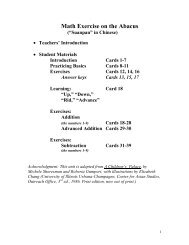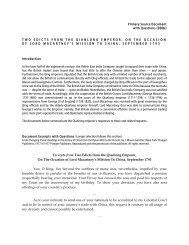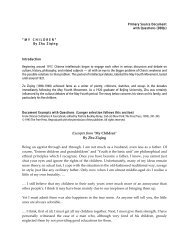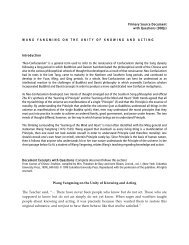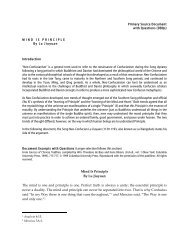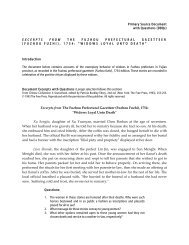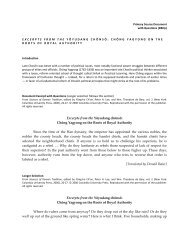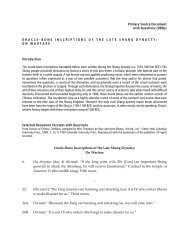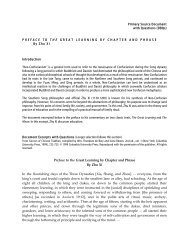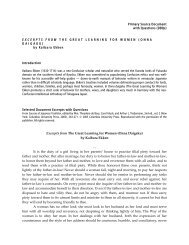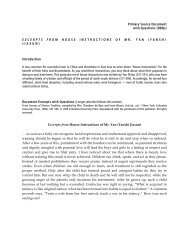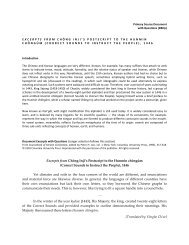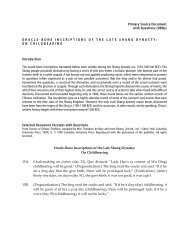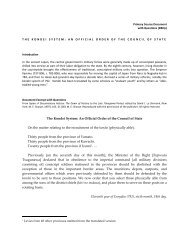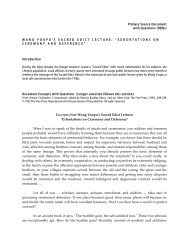SELECTION FROM THE XUNZI: “ENCOURAGING LEARNING”
SELECTION FROM THE XUNZI: “ENCOURAGING LEARNING”
SELECTION FROM THE XUNZI: “ENCOURAGING LEARNING”
You also want an ePaper? Increase the reach of your titles
YUMPU automatically turns print PDFs into web optimized ePapers that Google loves.
Primary Source Document<br />
with Questions (DBQs)<br />
S E L E C T I O N F R O M T H E <strong>XUNZI</strong>: <strong>“ENCOURAGING</strong> <strong>LEARNING”</strong><br />
Introduction<br />
Xunzi (Xun Qing, or Xun Kuang: c. 310-c. 219 BCE) lived at the very end of the Zhou dynasty. Like Mencius, he was an<br />
advocate and interpreter of the teachings of Confucius. Living a generation after Mencius, Xunzi lived through the<br />
final, brutal wars which ended with the state of Qin absorbing and unifying all the Chinese feudal states. Xunzi was a<br />
widely traveled scholar, teacher, and official.<br />
Document Excerpts with Questions (Longer selection follows this section)<br />
From Sources of Chinese Tradition, compiled by Wm. Theodore de Bary and Irene Bloom, 2nd ed., vol. 1 (New York: Columbia<br />
University Press, 1999), 161-164. © 1999 Columbia University Press. Reproduced with the permission of the publisher. All rights<br />
reserved.<br />
Selection from the Xunzi: <br />
“Encouraging Learning” <br />
<br />
The learning of the noble person enters his ear, is stored in his mind, spreads through his four <br />
limbs, and is made visible in his activity and his tranquility. In his smallest word, in his slightest <br />
movement, in everything, he may be taken as a model and a standard. The learning of the lesser <br />
man enters his ear and comes out his mouth. With only four inches between ear and mouth, <br />
how can he possess it long enough to beautify a seven‐foot body In antiquity learning was <br />
carried on for the sake of one’s self; today learning is carried on for the sake of others. 1 The <br />
learning of the noble person is for the sake of beautifying himself; the learning of the lesser man <br />
is offering bird and beast [to win attention from others]. … <br />
<br />
The noble person knows that what is not complete or what is not pure is unworthy to be called <br />
beautiful. Therefore he recites and reiterates so as to integrate it, reflects and ponders so as to <br />
comprehend it, determines his associations so that he may dwell in it, and eliminates what is <br />
harmful in order to preserve and nourish it. … Therefore he cannot be subverted by power or <br />
profit, nor swayed by the masses and multitudes, nor unsettled by the whole world. He follows <br />
this in life; he follows it in death — this is what is called holding firm to inner power. He who <br />
holds firm to inner power is able to order himself; being able to order himself, he can then <br />
respond to others. He who is able to order himself and respond to others is called the complete <br />
<br />
1<br />
Quoting Analects 14:25. A similar idea is found in Mencius 48:14. The idea is that learning is properly <br />
dedicated to self‐improvement but often distorted in the interests of impressing others. <br />
Primary Source Document, with Questions (DBQs) on<br />
<strong>SELECTION</strong> <strong>FROM</strong> <strong>THE</strong> <strong>XUNZI</strong>: <strong>“ENCOURAGING</strong> <strong>LEARNING”</strong><br />
man. Heaven manifests itself in its brightness; earth manifests itself in its breadth; the noble <br />
person values his completeness. <br />
<br />
Questions:<br />
1. What is the purpose of learning, as seen in these passages<br />
2. Compare Xunzi’s understanding of learning and the purpose of learning<br />
with that of Jewish, Christian, and Hindu thinkers.<br />
3. How does Xunzi distinguish between the “noble person” and the “lesser<br />
man” What might be the social and political roles expected of the noble<br />
person<br />
4. What does Xunzi mean when he says that the “noble man” may be “taken as<br />
a model and a standard”<br />
Longer Selection<br />
From Sources of Chinese Tradition, compiled by Wm. Theodore de Bary and Irene Bloom, 2nd ed., vol. 1 (New York: Columbia<br />
University Press, 1999), 161-164. © 1999 Columbia University Press. Reproduced with the permission of the publisher. All rights<br />
reserved.<br />
Selection from the Xunzi: <br />
“Encouraging Learning” <br />
<br />
The noble person says: Learning must never cease. Blue comes from the indigo plant, yet it is <br />
bluer than indigo. Ice is made from water, yet it is colder than water. Wood as straight as a <br />
plumb line may be bent into a wheel that is as round as if it were drawn with a compass, and, <br />
even after the wood has dried, it will not straighten out again because this is the way it has been <br />
bent. Thus wood marked by the plumb line will become straight, and metal that is put to the <br />
whetstone will become sharp. The noble person who studies widely and examines himself each <br />
day will become clear in his knowing and faultless in his conduct. <br />
<br />
Therefore if you do not climb a high mountain, you will not know the height of Heaven; if you <br />
do not look down into a deep valley, you will not know the depth of the earth; and if you do not <br />
hear the words handed down from the ancient kings, you will not know the greatness of <br />
learning and inquiry. The children of Han and Yue and of the Yi and the Mo 2 all make the same <br />
sounds at birth, but as they grow up they have different customs because this is the way they <br />
have been educated. The Ode says, <br />
<br />
O you noble men, <br />
Do not be constantly at ease and at rest. <br />
Be thoughtful in your official positions. <br />
<br />
2<br />
Han and Yue were ancient Chinese states; the Yi and the Mo were non‐Chinese tribes. <br />
Asia for Educators | Columbia University | http://afe.easia.columbia.edu Page 2 of 2
Primary Source Document, with Questions (DBQs) on<br />
<strong>SELECTION</strong> <strong>FROM</strong> <strong>THE</strong> <strong>XUNZI</strong>: <strong>“ENCOURAGING</strong> <strong>LEARNING”</strong><br />
Love those who are upright and correct. <br />
And the spirits will heed you, <br />
And will increase your blessings. 3 <br />
<br />
Of spirits there is none greater than being transformed through the Way; of blessings there is <br />
none more lasting than being without misfortune. <br />
<br />
Once I spent an entire day in thought, but it was not as good as a moment of study. Once I <br />
stood on tiptoe to gaze into the distance, but it was not as good as climbing to a high place to <br />
get a broad view. Climbing to a high place and waving will not make your arm any longer, but <br />
you can be seen from farther away. Shouting down the wind will give your voice no added <br />
urgency, but you can be heard more distinctly. By borrowing a horse and carriage you will not <br />
improve your feet, but you can cover a thousand li. By borrowing a boat and paddles you will <br />
not improve your ability in water, but you can cross rivers and seas. The noble person is by <br />
birth no different from others, but he is good at borrowing from external things. <br />
<br />
In the southern regions there is a bird called the meng dove. It makes its nest out of feathers <br />
woven together with hair and suspends it from the tips of the reeds. When the wind comes, the <br />
reeds break, the eggs are smashed, and the young are killed. This is not because the nest is <br />
wanting but, rather, because of the way it is attached. In the west there is a tree called the yegan. <br />
Its trunk is four inches tall, and it grows on top of high mountains, looking down into chasms a <br />
hundred fathoms deep. This is not because the treeʹs trunk is able to grow but, rather, because <br />
of the place where it stands. If raspberry vines grow in the midst of hemp, they will stand up <br />
straight without being staked; if white sand is mixed with mud, it too will turn black. If the root <br />
of the orchid and the rhizome of the valerian are soaked in the water used to wash rice, 4 the <br />
noble person will not go near them, and the commoner will not wear them — not because their <br />
substance is not beautiful but because of what they have been soaked in. Therefore the noble <br />
person will choose with care the place where he will reside, and will be accompanied by <br />
scholars when he travels. In this way he avoids depravity and meanness and approaches <br />
centrality and correctness. <br />
<br />
Accumulate earth to make a mountain, and wind and rain will flourish there. Accumulate water <br />
to make a deep pool, and dragons will be born from it. Accumulate goodness to create virtue, <br />
and spiritual clarity will naturally be acquired; there the mind of the sage will be fully realized. <br />
Thus if you do not accumulate little steps, you will not have the means to journey a thousand li, <br />
and if you do not pile up small streams, you will have no way to fill a river or a sea. Though a <br />
thoroughbred like Qiji cannot cover ten paces in one leap, the sorriest nag can do it in ten <br />
yokings. Achievement consists of never giving up. <br />
<br />
3<br />
Ode 207. <br />
4<br />
Following the reconstruction proposed by John Knoblock in Xunzi—A Translation and Study of the <br />
Complete Works, vol. 1, pp. 137, 268–69. <br />
Asia for Educators | Columbia University | http://afe.easia.columbia.edu Page 3 of 3
Primary Source Document, with Questions (DBQs) on<br />
<strong>SELECTION</strong> <strong>FROM</strong> <strong>THE</strong> <strong>XUNZI</strong>: <strong>“ENCOURAGING</strong> <strong>LEARNING”</strong><br />
<br />
If you start carving, and then give up, you cannot even cut through a piece of rotten wood; but <br />
if you persist without stopping, you can carve and inlay metal or stone. Earthworms lack the <br />
power of sharp claws or teeth, or strong muscles or bones, yet above ground they feast on the <br />
mud, and below they drink at the yellow springs. This is because they keep their minds on one <br />
thing. Crabs have six legs and two pincers, but unless they can find an empty hole dug by a <br />
snake or a water serpent, they have no place to lodge. This is because they allow their minds to <br />
go off in all directions. Thus if there is no dark and dogged will, there will be no bright and <br />
shining clarity; if there is no dull and determined effort, there will be no brilliant and glorious <br />
achievement. One who travels two roads at once will arrive nowhere; one who serves two <br />
masters will please neither. … <br />
<br />
The learning of the noble person enters his ear, is stored in his mind, spreads through his four <br />
limbs, and is made visible in his activity and his tranquility. In his smallest word, in his slightest <br />
movement, in everything, he may be taken as a model and a standard. The learning of the lesser <br />
man enters his ear and comes out his mouth. With only four inches between ear and mouth, <br />
how can he possess it long enough to beautify a seven‐foot body In antiquity learning was <br />
carried on for the sake of one’s self; today learning is carried on for the sake of others. 5 The <br />
learning of the noble person is for the sake of beautifying himself; the learning of the lesser man <br />
is offering bird and beast [to win attention from others]. Thus to proffer information when you <br />
have not been asked for it is called officiousness; to proffer information on two questions when <br />
you have only been asked about one is garrulity. Officiousness is to be condemned, so too is <br />
garrulity. The noble person is like an echo. <br />
<br />
In learning nothing works so well as to be near a person of learning. The Rites and the “Music” <br />
provide models but no explanations. The Odes and the Documents are devoted to antiquity and <br />
lack immediacy. The Spring and Autumn Annals is laconic and not readily accessible. But <br />
following alongside a person of learning and repeating the explanations of the noble person <br />
bring one honor everywhere and allow one comprehensive knowledge of the world. Therefore <br />
it is said that “In learning nothing works so well as to be near a person of learning.” <br />
<br />
In the course of learning there is nothing more expedient than to devote yourself to a person of <br />
learning, and next to this is to pay homage to the rites. If you can neither devote yourself to a <br />
person of learning nor pay homage to the rites, how will you do anything more than learn <br />
randomly or passively follow the Odes and the Documents In this case you will never to the end <br />
of your days escape from being merely a vulgar scholar. If you would take the ancient kings as <br />
your source and humaneness and rightness as your foundation, then rites are the means of <br />
correctly ordering warp and woof, pathways and byways. … <br />
<br />
<br />
5<br />
See footnote 1, above. <br />
Asia for Educators | Columbia University | http://afe.easia.columbia.edu Page 4 of 4
Primary Source Document, with Questions (DBQs) on<br />
<strong>SELECTION</strong> <strong>FROM</strong> <strong>THE</strong> <strong>XUNZI</strong>: <strong>“ENCOURAGING</strong> <strong>LEARNING”</strong><br />
One who misses one shot in a hundred does not deserve to be called a good archer; one who <br />
does not take the last half step in a journey of a thousand li does not deserve to be called a good <br />
carriage driver; one who does not comprehend moral relationships and categories and does not <br />
become one with humaneness and rightness does not deserve to be called good in learning. <br />
Surely learning is learning to unify oneself. Someone who on departing does one thing and on <br />
entering does another is a person of the roads and alleys; one who does a small amount of good <br />
and much that is not good is a Jie or Zhou or Robber Zhi. Complete it, realize it to the fullest — <br />
only then will you be learned. <br />
<br />
The noble person knows that what is not complete or what is not pure is unworthy to be called <br />
beautiful. Therefore he recites and reiterates so as to integrate it, reflects and ponders so as to <br />
comprehend it, determines his associations so that he may dwell in it, and eliminates what is <br />
harmful in order to preserve and nourish it. He causes his eyes to be devoid of any desire to see <br />
what is not right, his ears to be devoid of any desire to hear what is not right, his mouth to be <br />
devoid of any desire to say what is not right, and his mind to be devoid of any desire to think <br />
what is not right. Having arrived at this, he takes utmost pleasure in it. His eyes will take <br />
greater pleasure in it than in the five colors; his ears will take greater pleasure in it than in the <br />
five sounds; his mouth will take greater pleasure in it than in the five flavors; and his mind will <br />
benefit more from it than from possession of the world. 6 Therefore he cannot be subverted by <br />
power or profit, nor swayed by the masses and multitudes, nor unsettled by the whole world. <br />
He follows this in life; he follows it in death — this is what is called holding firm to inner <br />
power. He who holds firm to inner power is able to order himself; being able to order himself, <br />
he can then respond to others. He who is able to order himself and respond to others is called <br />
the complete man. Heaven manifests itself in its brightness; earth manifests itself in its breadth; <br />
the noble person values his completeness. <br />
<br />
6<br />
John Knoblock reads this, alternatively, to mean, “his mind benefits from possessing all that is in the <br />
world.” (Xunzi, vol. 1, p. 142). <br />
Asia for Educators | Columbia University | http://afe.easia.columbia.edu Page 5 of 5



